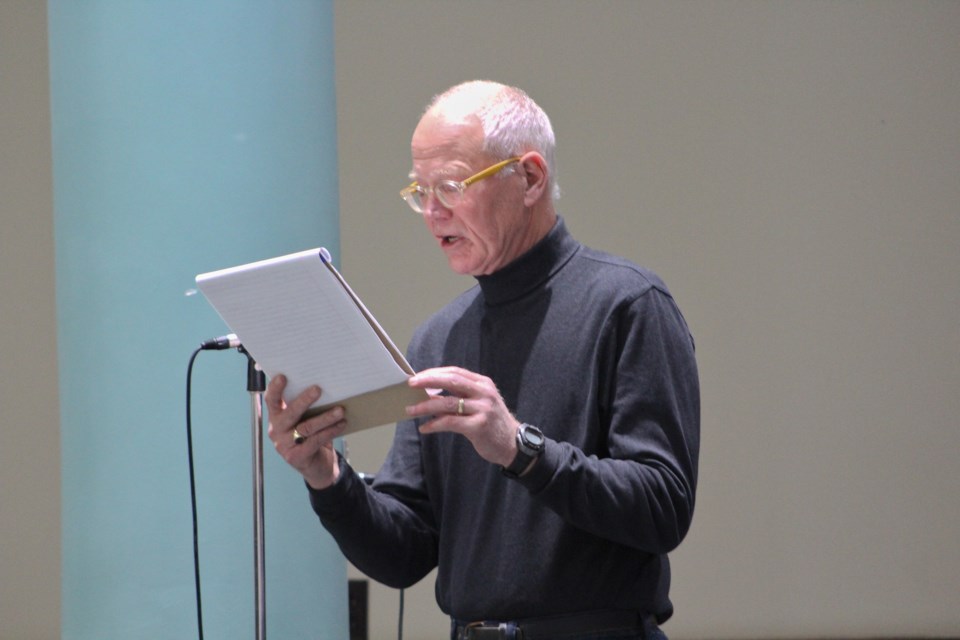City council received an earful Monday night from residents with opinions on the downtown/waterfront redevelopment plan.
Of the many suggestions offered during the public planning meeting, one seemed to come up more than others: Defer any decisions on changes to the zoning bylaw and Official Plan.
Council obliged.
Staff had recommended council waive the 14-day “cooling-off period” and make a decision Monday night.
The city wants to see a mix of residential and commercial development on the old rail bed land, the adjacent land where the Co-Op Feed Store used to be. The city’s preferred plan calls for part of the Metro plaza on Front Street, which the city has purchased, to be demolished to make way for an extension of Coldwater Street through to the lake.
The former rail bed itself and the land in between are designated as parkland and major open space in the Official Plan, and open space in the zoning bylaw. The plaza property is designated as a downtown intensification area and has commercial zoning. The proposed change would “expand that downtown area boundary into the former rail bed lands and former Co-Op Feeds lot and change the zoning to match what it is council has directed us to do so,” Ian Sugden, the city’s director of development services, previously explained.
Parts of the plan are not sitting well with Peter Slofstra. More than a year ago, he and his wife, Marja, bought a house on Laclie Street, beside the Royal Oak restaurant. At the time, he said, city planning staff indicated it would be “highly unlikely that anything would be built on the city-owned land behind and beside us.”
“We would not have bought it had we known what you were planning,” Slofstra told council. “Imagine our shock when the newspaper informed us in December 2017 that rows of townhouses were imagined in our backyard, blocking our view of the park and Lake Couchiching, the reason for moving here from Kitchener.”
He said he was pleasantly surprised to also have a view of all of the activity that goes on at the park and to see how busy it was. The Slofstras even “gladly and freely” allowed some visitors to park on their property.
“As you promote the waterfront development, we urge you to also protect the waterfront experience that has been enjoyed for decades — launching a boat, setting up a barbecue or enjoying a festival while being able to find a place to park,” he said, airing a concern about a reduction of parking included in the plan. “This experience is a common-good goal as important as providing additional housing and increasing the city’s tax base.”
Slofstra said he wasn’t there “to make a NIMBY argument … but after living here for a year and observing what happens behind us, common sense tells us that our waterfront needs all the parking it can get for everyone to keep enjoying the lake.”
The issue of affordable housing was also raised. While the redeveloped waterfront might be attractive to visitors, the city should not forget about some of its more vulnerable residents, said Dennis Rizzo. He pointed to the city’s Affordable Housing Action Plan, which includes recommendations to ensure such housing is included in any waterfront redevelopment.
As it is, he said, “the plan … delivers our fate into the hands of developers.” He wants the city to include a requirement for some affordable housing.
“It would be disingenuous to assume that the developers, left on their own, would build affordability into those sites, but would seek to maximize profits,” he wrote in a letter that was included in the meeting’s agenda package.
He also wrote, “High-rise development makes no sense in terms of preserving the waterfront. It only curries favour with developers and the people who can afford the price of these units.”
Another concern brought up by some of those in attendance was a potential reduction in the amount of parkland. With the city planning to accommodate population growth, “for us to get rid of parkland and change it to anything else strikes me as insane,” said Rick Evans.
Dael Morris had similar reservations.
“It’s important that you have some extra land there to expand the park whenever there is an expanding population, not shrink it as is happening here,” she said.
Betsy Gross expressed her disappointment with the lack of parking in the area under the proposed plan.
“If they have to park four blocks away, they won’t come. You know that,” she told council, saying approving the plan as is “will be a great mistake that all of you will regret 10 years from now.”
"Orillia doesn't want to be Barrie. Orillia wants to be ourselves."
Near the end of the meeting, Sugden explained the parking lot and public use that is currently permitted on the land in question would not have to change under the proposed plan. There is still wiggle room, allowing council to decide the uses for the property, he said, as the details will be worked into the request for proposals.
Councillors Mason Ainsworth and Sarah Valiquette-Thompson urged their colleagues to hold a second public meeting and allow the next term of council to make the decision. Council agreed to do so.
The next meeting will take place Dec. 21 at a time to be determined. Residents will again have the opportunity to share their thoughts with council at that meeting.
